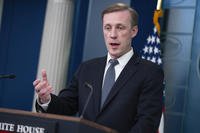The world is a dangerous, uncertain place, and nobody knows where the next crisis or conflict could spark -- which means business is good for the world's largest defense contractor. Lockheed Martin CEO Robert Stevens told reporters Tuesday morning that his company's present and future both look strong, although he stressed the defense giant isn't immune to the "pressures" -- the euphemism we all have to say use in Washington -- of Austerity America.
"There is no overhead expense we're not looking at," Stevens told Buzz. "We're following the lead of our customers, who see the same world we see." Lockheed has eliminated about 20,000 employees, cut 600 executives, and in a mostly symbolic move, drastically scaled back its presence at the major defense and trade shows. Gone are display booths the size of cities, enormous video displays, and Lockheed's industry-leading logo tchotchkes, including its famous dancing blue wind-up man, its sticky-note stationary kit, and its combination tape measure and screwdriver set.
With 2010 sales of almost $50 billion -- and hundreds of billions more in long-term contracts and orders -- Lockheed's reduced air and trade show presence amounts is an eye-dropper's worth of the Pacific, but it's just the most visible of what Stevens said was "a broad portfolio of cost-reduction initiatives."
If Lockheed can show the Pentagon and Congress that it's voluntarily slimming down as much as it can, that could help the company through the coming years' budget cuts, officials hope. Like the outgoing Secretary Gates, Stevens cautioned that what he called a "peanut butter approach" -- in which budget cuts are spread around everywhere -- would be the worst strategy to take. The defense industry will deal with some reductions, he said, but they should be done in the right way.
Stevens was careful to praise Gates and his forthcoming successor, Leon Panetta; Stevens said he and Lockheed have had good dealings with both men, and he said the company sees every reason why that should continue with Panetta in the Pentagon. And overall, Lockheed sees lots of opportunities for new business in both its existing defense businesses and also in less hardware-focused national security areas: Stevens cited cyber-security and counter-terrorism systems as two examples.
Stevens and other Lockheed officials even were bullish on the F-35, far over budget and behind schedule, and which was trashed by almost everyone at last week's Senate Armed Services Committee hearing. But the company knows that no matter how angry people get, the U.S. and its eight international allies have no choice but to push forward with the F-35 -- which officials say is coming along fine anyway -- and Lockheed is already looking forward to adding still more international customers. (We'll have another post specifically about Tuesday's F-35 updates.)
So although Stevens said he knows Austerity America means the end of limitless defense budgets -- "We all know that the challenge wer'e going to face together are going to be significant," he said -- Stevens and his colleagues also clearly believe Lockheed Martin will continue to be one of the top players in the game for a long time.








